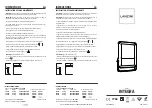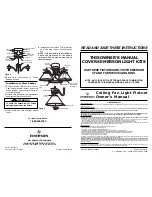
Specifying a Lighting System
Crestron Residential Lighting Design Guide
Doc. 5999F
10
Residential Lighting Wiring Plan
The wiring plan includes all enclosures and the
interconnecting wiring. The designer determines the
location of the enclosure(s), the route of keypad and
touchpanel connections to the enclosure(s), the route
of the interconnecting cable from the processor to the
other enclosure(s), and the high voltage load routes
to the enclosure or dimmer.
Ensure there are enough connectors and power (PAC2 offers
50W) in the main enclosure for all user interfaces. Each
enclosure filled with dimmers is connected to the main
enclosure and processor using low voltage wire. Dimmer
enclosures are distributed as needed.
Equipment List Specification
The equipment list is based on the requirements collected for
the lighting system in the load schedule. This is a sequential
process. The information gathered in previous steps is
required to complete the next. Once all the steps are
completed, a complete Bill of Material for the system is
created.
Module selection – based on the number and type
of loads
Automation enclosure selection – based on the
number of modules and the available space in the
enclosure
User interface selection – based on the user control
requirements
Wiring plan – based on the previous steps and the
layout of the environment
Control processor – based on the size of the system
(large systems should have a dedicated processor)
Network block selection – based on the layout and
distribution of the loads and user interfaces
Accessories selection – based on the required
accessories (telephone and alarm systems, HVAC
control, intercom systems, occupancy sensors, etc.)
Ordering a Crestron Residential
Lighting System
These are the steps for ordering a Crestron Residential
lighting control system, regardless of the size.
Each system and module contains the appropriate installation
literature and operation guide.
Steps to order a lighting system:
STEP 1
:
Survey all controlled lights and loads. In hybrid
systems determine which loads are under local control and
which are to be wired to centralized modules
STEP 2
: Determine the number and types of control modules
and terminal blocks needed to control lights and loads based
on the load schedule and wiring plan
STEP 3
: Determine the number and type of automation
enclosures required
STEP 4
: Determine the number of control processors and
related accessories required
STEP 5
: Determine the number and types of keypads, wall
panels, iLux™ devices, infiNET™ wireless devices,
shade/drape controllers, and touchpanels
STEP 6
: Determine the wiring accessories, cabling and
power supplies required
STEP 7
: Place an order for identified Crestron items
Nearly all required documentation, such as load schedules
and wiring, equipment lists, engraving files and more can
be generated by using the Crestron D3 Pro Lighting and
Automation System Software.
Crestron ships all items to the job site for assembly and
wiring.
NOTE
: If engraving is desired on infiNET devices, IT MUST BE
SPECIFIED UPON ORDER. Due to UL restrictions, the button
caps cannot be replaced in the field. Therefore, only new
units must be engraved before leaving the Crestron factory.
Содержание Residential Lighting
Страница 1: ...Crestron Green Light Residential Lighting Design Guide...
Страница 2: ......
Страница 5: ......
Страница 29: ...Crestron Residential Lighting Design Guide DIN Rail Products Doc 5999F 24 Example DIN Rail System...
Страница 55: ...Residential Lighting Design Guide infiNET Wireless Technology Doc 5999F 50 infiNET Wireless Technology...
Страница 57: ...Control Processors Crestron Residential Lighting Design Guide Doc 5999F 52 Example infiNET system...
Страница 69: ...Residential Lighting Design Guide Appendix A Doc 5999F 64 Circuits and Interfaces...
Страница 70: ...Residential Lighting Design Guide Appendix A Doc 5999F 65 Module Wiring...
Страница 71: ...Residential Lighting Design Guide Appendix A Doc 5999F 66 PAC2 Lighting Control Processor Connections...
















































